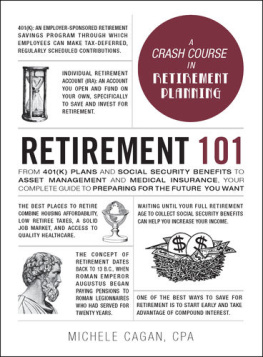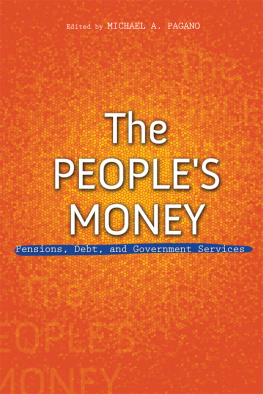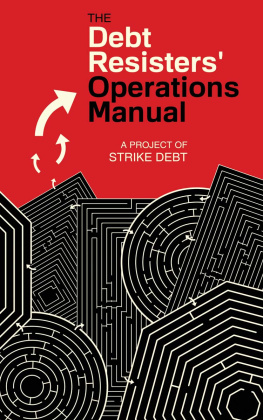Copyright 2011 Bill Tufts, Lee Fairbanks
All rights reserved. No part of this work covered by the copyright herein may be reproduced or used in any form or by any meansgraphic, electronic or mechanical without the prior written permission of the publisher. Any request for photocopying, recording, taping or information storage and retrieval systems of any part of this book shall be directed in writing to The Canadian Copyright Licensing Agency (Access Copyright). For an Access Copyright license, visit www.accesscopyright.ca or call toll free 1-800-893-5777.
Care has been taken to trace ownership of copyright material contained in this book. The publisher will gladly receive any information that will enable them to rectify any reference or credit line in subsequent editions.
The material in this publication is provided for information purposes only. Laws, regulations, and procedures are constantly changing, and the examples given are intended to be general guidelines only. This book is sold with the understanding that neither the author nor the publisher is engaged in rendering professional advice. It is strongly recommended that legal, accounting, tax, financial, insurance, and other advice or assistance be obtained before acting on any information contained in this book. If such advice or other assistance is required, the personal services of a competent professional should be sought.
Wiley publishes in a variety of print and electronic formats and by print-on-demand. Some material included with standard print versions of this book may not be included in e-books or in print-on-demand. If this book refers to media such as a CD or DVD that is not included in the version you purchased, you may download this material at http://booksupport.wiley.com . For more information about Wiley products, visit www.wiley.com .
Library and Archives Canada Cataloguing in Publication
Tufts, Bill, 1959
Pension Ponzi : how public sector unions are bankrupting Canada's health care, education and retirement / Bill Tufts, Lee Fairbanks.
Also issued in electronic formats.
ISBN 978-1-1180987-3-8
1. Civil serviceCanadaPensions. 2. Debts, PublicCanada. 3. CanadaEconomic policy1991-. I. Fairbanks, Lee, 1954- I. Title.
JL111.S3T83 2011 331.25'29135171 C2011-906101-5
ISBN: 978-1-118-09988-9 (ePub); 978-1-118-09986-5 (eMobi); 978-1-118-09987-2 (ePDF)
Production and Editorial Credits
Executive Editor: Karen Milner
Production Editor: Jeremy Hanson-Finger
Cover design: Adrian So
Cover photo credit: Thinkstock
Interior design: Thomson Digital
John Wiley & Sons Canada, Ltd.
6045 Freemont Blvd.
Mississauga, Ontario
L5R 4J3
Foreword
By Catherine Swift, President, Canadian
Federation of Independent Business
The demographic tsunami that has already hobbled many European countries and U.S. states is just starting to hit Canada. Pension and benefit promises that have been made over the past several decades by both private corporations and governments to employees are now coming due as the baby boomers retire, and there has not been anywhere near sufficient money put aside to pay these obligations.
As private sector companies have struggled to remain competitive in the marketplace, they have already, in recent years, scaled back pensions and benefits, or risked facing bankruptcy. As governments do not have to compete in the same manner, and are, in fact, the one business that can force customers to pay by law via taxes, they have had the ability to procrastinate on this issue even longer than have private sector players.
The end result is that Canadian taxpayers now owe hundreds of billions of dollars in pensions and benefits that governments have already promised, but never put aside the funds to pay for. If governments had been honest and funded these plans properly from the outset, protests from private sector taxpayers would have been so strong that the situation would not have been permitted to become so unbalanced in the first place, with public sector workers now earning much more in compensation and benefits than their private sector counterparts, and retiring much earlier with very generous pensions and other benefits.
With the baby boom generation starting to retire, the chickens are coming home to roost. Pension Ponzi outlines how this predicament came into being, how extensive and outrageous Canada's national pension liability situation currently is, and what needs to be done before we destroy our economy and effectively bankrupt the taxpayers who are being asked to pay for this enormous shortfall.
A warning: All Canadians who read this book will be enraged at how, over the decades, our governments have duped us all and built up a massive debt that is now coming due. But all Canadians should read this book in order to become informed about this complex issue, and realize the need for all of us to demand of our politicians, at all levels, that it be addressed with the utmost urgency.
Introduction
Canadians are blissfully unaware that Canada's economic system is broken, defrauded by the most successful economic organization in historythe public sector union. The truth is, our politicians have been coerced by public sector unions into paying salary and benefits packages far beyond what our economy can support, as well as guaranteeing to pay inflated pensions to those same workers after retirement. As the National Post said, these giant public pension funds are wealth confiscated by governments... using money taxed from all their constituents. Almost every government employee including elected politicianswill benefit from these pensions, at the expense of the vast majority of Canadians.
The 20 per cent of the workforce that belongs to public sector unionscivil servants, teachers, firefighters, police officers, armed forces personnel, and all government workers, including politicianshave quietly negotiated the most lucrative compensation packages in history. And these will all be paid for with tax dollarsand massive government debt. The CFIB Wage Watch Report shows public sector salaries and benefits exceed those of private industry by up to 30 per cent. More troubling is the fact that their guaranteed, indexed-to-inflation pensions are creating two classes of retirees.
This book will open your eyes to one of the greatest reallocations of legal assets in the history of the world. Some call it pension envy, some call it pension apartheid, some call it fraud. We call it a pension Ponzi plan, an unsustainable scheme to funnel money from one group of Canadians to another under the pretense of providing services. Who will be the loser when it collapses, as all Ponzi schemes eventually do? Consider these facts:
- The Ontario Teachers' Pension Plan (OTPP) The extent of the CPP shortfall is unknown. These shortfalls must be covered by increased taxes yet to come.
- The average CPP benefit payment is $5,919 per year. The average annual pension for a new OTPP retiree, in 2010, is around $42,900 per year.
- The City of Hamilton pension funds have deficits estimated to be in excess of $2 billion. These deficit stories are repeated across the country, creating billions of dollars of hidden liabilities. Because these pensions are guaranteed by you, as a taxpayer, the shortfalls will have to be covered either by future taxes or service cuts to health care, education, and other government programs.
- Combined federal and provincial debt now totals more than $1.2 trillion, most of it created by paying public service employees unrealistic wages and making allocations to their pensions. How will the next generation react when it is forced to repay this debt?








